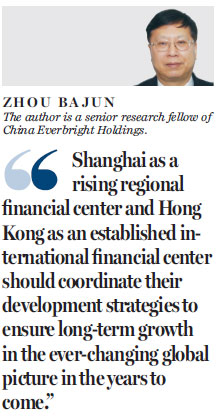Western double standards exposed as mainland ties remain crucial to HK
Updated: 2016-04-13 07:59
By Zhou Bajun(HK Edition)
|
|||||||||
The Z/Yen Group, a think tank headquartered in the City of London, has published the latest edition of its Global Financial Centres Index (GFCI), in which Hong Kong has slipped one place to fourth from third in the world six months ago. This is the first time Hong Kong has dropped out of the top three financial centers since September 2009. This indicates that the city's international financial center status faces growing challenges and competition.
The GFCI ranks 102 cities worldwide twice a year, based on scores in business environment, infrastructure development, human capital, reputation and general factors. It should be noted that the latest index does not show how the 102 cities have scored in each category like the previous editions did. That means we do not know what exactly caused Hong Kong's downgrade this time. According to a news report in Ming Pao on April 8, Z/Yen Group Deputy Director Mark Yeandle noted that many respondents expressed concern over the mainland's growing influence over Hong Kong in its financial, political and economic affairs.
This is after two US-based leading international rating agencies, Moody's and Standard & Poor's, recently downgraded Hong Kong's credit outlook to negative. The main excuse cited by the two rating agencies is also the mainland's growing influence over Hong Kong. Such views have left us with the impression that major Western opinion writers see the mainland as a negative factor for Hong Kong.
Interestingly, the GFCI shows Singapore and Shanghai ranking first and second as "more important financial centers in the coming years". The rankings were based on the number of mentions each city received in the previous 24 months, with Singapore mentioned 121 times and Shanghai 120 times. The Moroccan city of Casablanca came in third with 74 mentions, while Hong Kong was fifth with 55. In the meantime the overall placing of financial centers in the GFCI saw Shanghai rising to 16th and Shenzhen to 19th.
All these results indicate a double standard toward China on the part of many Western observers, who say the mainland's economy is growing to the benefit of the global economy but somehow having a negative effect on Hong Kong's at the same time.
Incidentally, just before the latest index was released by the Z/Yen Group, the London Business School and the University of Hong Kong (HKU) jointly published the results of a survey, in which most respondents expected the renminbi to become a major currency competing with the US dollar, the euro, the British pound and the Japanese yen in the global market. Some 62 percent of them even believe the Hong Kong dollar will eventually go out of circulation.
With these Western opinions in mind, Hong Kong and its financial industry in particular need to fully examine a looming question: Is the mainland a risk or an opportunity for Hong Kong?
To answer this question one needs to understand the global economic, political and financial situation, which is undergoing a historical readjustment right now. The geopolitical backdrop of this question reminds me of a speech I delivered at an academic symposium held by HKU 20 years ago - on March 22, 1996 to be exact. The title of that speech was "New 'Twin Cities' in the 21st Century". Three weeks before I made that speech, Singaporean statesman Lee Kuan Yew told a French media outlet that he believed Shanghai would replace Hong Kong as the leading center of international finance, trade and commerce in the region in 30 years' time, but did not explain why. In my speech I fully acknowledged the remarkable progress Shanghai had made in economic reform and opening-up to the outside world, but also concluded Shanghai would not be able to replace Hong Kong because it could not be as open as Hong Kong in 30 years' time.
Fast forward 20 years and we are now only 10 years away from what Lee envisioned, and things seem to be indeed progressing toward realizing his vision. A lot has happened in the past 20 years and Lee could not have foreseen all of that, which was probably why he did not elaborate 20 years ago. Since China became a member of the World Trade Organization in 2001, its trade with the rest of the world and the US-led Western economies in particular has grown in leaps and bounds.
Its critical role in driving the global economy forward has become even more obvious since the credit debacle of the US triggered the global financial crisis of the century in 2008. Today the economic, political and financial center of gravity continues to shift from the West (North America and Europe) toward the East (Asia), whether people like it or not. And the Chinese mainland, including Shanghai, is becoming more open than ever.
Therefore, Shanghai as a rising regional financial center and Hong Kong as an established international financial center should coordinate their development strategies to ensure long-term growth in the ever-changing global picture in the years to come. By enhancing ties with Shanghai, Hong Kong stands to profit immensely from financial cooperation and increased mutual market access.

(HK Edition 04/13/2016 page10)